|
|
|
Sort Order |
|
|
|
Items / Page
|
|
|
|
|
|
|
| Srl | Item |
| 1 |
ID:
124622
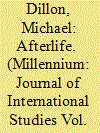

|
|
|
|
|
| Publication |
2013.
|
| Summary/Abstract |
This article provides a prolegomena to a discussion of what Michel Foucault meant by 'political spirituality' and 'the courage of truth (parrhesia)', terms which preoccupied his last lectures at the Collège de France and through which he continued to pursue his lifelong concern with the politics of truth and the history of the present. The article approaches these issues through the fate of the three strategic figures - God, Man and Life - that have traditionally problematised western rules of truth and truths of rule. It then proceeds to explore the living death, or afterlife, of Man and Life, which calls for a new courage of truth, and to which 'political spirituality' has been one response.
|
|
|
|
|
|
|
|
|
|
|
|
|
|
|
|
| 2 |
ID:
124625
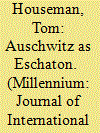

|
|
|
|
|
| Publication |
2013.
|
| Summary/Abstract |
The recent engagement with 'post-secular' thought has been especially pronounced within the critical tradition, in which messianic eschatology has been variously rehabilitated or reaffirmed. Amongst others, the thought of Theodor W. Adorno has recently been enlisted in this endeavour, culminating in a synthesis of critical theory and Jewish Gnosticism. This article argues that such a reading not only misrepresents Adorno's thought, but also misses its critical contribution. In contrast to the project of revivifying the messianic in order to save critical theory from aimless nihilism, Adorno's eschatology, inherited through a critical dialogue with Hegel, Marx and Benjamin, is a negative imprint, devoid of the theism, teleology and promises of salvation that characterise and secure other appropriations of the eschatological tradition. To recognise the originality and potency of Adorno's critical reworking of eschatology, I argue, we must understand the theological role played by Auschwitz throughout his writings. Adorno constructs a constellation in which Auschwitz is the eschaton, the horrific fulfilment of the promise of history. In doing so, he reconfigures the ethical impulse of the critical tradition: critical theory derives its purpose and urgency not from the promise of a better world, but from the horror of the present one.
|
|
|
|
|
|
|
|
|
|
|
|
|
|
|
|
| 3 |
ID:
124617
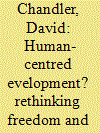

|
|
|
|
|
| Publication |
2013.
|
| Summary/Abstract |
Today's dominant discourses of international development increasingly focus on human agency as the measure of development in terms of individual capabilities. The individualised understanding of development takes a 'human-centred' or 'agent-orientated' view of the barriers to development. This article seeks to critically engage with the view of the human and of human agency articulated within this approach. In this discourse, development is taken out of a macro-political-economy context, in which development policies are shaped by social and political pressures or state-led policies. Foucault's insights on the rearticulation of power - shifting from the state-based, sovereign and disciplinary approaches of government ruling over society, towards the biopolitical or 'human-centred' approaches of governance through social processes - will be used to critically engage with the capabilities approach. This article genealogically draws out the changing nature of Western discourses of development and the understanding of policy practices as promoting the empowerment of the post-colonial other in order to examine how development and autonomy have been radically differently articulated in discourses of Western power and how today's discursive framing feeds on and transforms colonial and early post-colonial approaches to the human subject.
|
|
|
|
|
|
|
|
|
|
|
|
|
|
|
|
| 4 |
ID:
124628
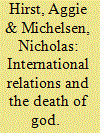

|
|
|
|
|
| Publication |
2013.
|
| Summary/Abstract |
Friedrich Nietzsche's proclamation of the 'Death of God' has come to function as something akin to a heuristic device in International Relations (IR) signifying the shattering of metaphysical and ontological certainty in European (post)modernity. According to Chris Brown, Nietzsche's declaration is commonly believed to signify a 'crisis in thought' which constitutes a 'genuine danger' insofar as it risks 'the collapse of the foundations of the old world order'.1 Roland Bleiker notes that such a crisis is deemed by many to be symptomatic of the loss 'of a generally accepted worldview that provided a stable ground from which it was possible to assess nature, knowledge, common values, truth, politics - in short, life itself'.2 This forum seeks to interrogate the substance and consequences of the claim that 'God is Dead' in the context of global politics, and specifically its implications for IR theory, contemporary political violence, and questions of ethics and responsibility.3 Before providing an overview of the points of synergy, agonism and divergence in the papers, this introduction will offer some contextualising remarks relating to the metaphysical, conceptual and historical parameters of the 'Death of God', marking its emergence in European political thought and provisionally mapping the terrain of its pertinence to contemporary IR.
|
|
|
|
|
|
|
|
|
|
|
|
|
|
|
|
| 5 |
ID:
124627
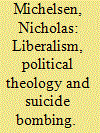

|
|
|
|
|
| Publication |
2013.
|
| Summary/Abstract |
This article sets out to interrogate the relationship between Liberalism and suicide bombing. It maps and critically examines accounts of suicide bombing as a practice diametrically opposed to the secular logics of liberal governance, or as the direct expression of the traces of sovereign exceptionalism that haunt the global operation of Liberal biopower. I argue that a uniquely liberal analytic of human finitude establishes conditions of political intelligibility for suicide bombings today. As such, the contemporary politics of suicide may be understood as in critical communication with liberal political theologies of immanent governance over the human qua mortal, rather than as structurally deriving from political theologies of sovereign power.
|
|
|
|
|
|
|
|
|
|
|
|
|
|
|
|
| 6 |
ID:
056496


|
|
|
| 7 |
ID:
124619


|
|
|
|
|
| Publication |
2013.
|
| Summary/Abstract |
This article advances the argument that security integration is occurring in the European Union (EU) as a result of the influence of certain knowledge-based networks or epistemic communities. Given that EU member-states consistently resist integration in areas that are central to traditional state sovereignty, security integration presents a puzzle. The case of the EU Military Committee (EUMC) will serve as an example of how and why epistemic communities matter in security decision-making. Although the EUMC and the Common Security and Defence Policy are relatively new, the power of shared expertise among high-level military officers has already begun to dismantle sovereign barriers to security integration. In considering the puzzle of security integration, this article suggests that the epistemic community framework provides a better explanation for the emergence of a European security space than alternative arguments, such as principal-agent theory, intergovernmental bargaining, and regime theory. The case of a military epistemic community also serves to broaden the epistemic community literature, which tends to focus somewhat narrowly on cases of environmental and economics experts.
|
|
|
|
|
|
|
|
|
|
|
|
|
|
|
|
| 8 |
ID:
124626
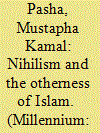

|
|
|
|
|
| Publication |
2013.
|
| Summary/Abstract |
The 'death of God' remains a recognisable frame to approach Western cultural malaise captured in its nihilism. Removed from this spatio-temporal horizon, however, claims of fin de siècle appear partial, provincial, and extraneous. For worlds 'outside' the West, the idea of the death of God is an absurdity, excessive and irrelevant. Viewed from relativist positionality, God's demise presents as a strictly Western problem. On the other hand, nihilism is neither a culturally restricted state nor a unique property of Western self-annihilating proclivities. This paper explores the assumed 'Otherness' of Islam in its encounter with nihilism, especially in reference to the question of political violence. Distinction between life-affirming and life-negating impulses of political violence helps situate religiously coded violence and the nihilistic violence of modernity. In the case of Islamic violence, it is argued, this distinction is often blurred. The paper maps out the cosmological basis of Islamic alterity, one that is increasingly tested under conditions of globalising modernity and its pathologies.
|
|
|
|
|
|
|
|
|
|
|
|
|
|
|
|
| 9 |
ID:
124618
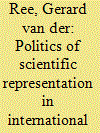

|
|
|
|
|
| Publication |
2013.
|
| Summary/Abstract |
In IR, representation of knowledge is not neutral, but follows tacit conventions that have become naturalised in the field. In many ways, these conventions are shaped by the so-called 'science question', which has shaped the field since the first debate. This article explores three ways in which knowledge is represented in the discipline: numbers, graphical models, and metaphors. Numbers and formal models reinforce the 'science question' by the ways in which they exclude audiences, objectify representation and desocialise knowledge. Metaphors also fulfil objectifying functions, particularly through the ways that they link in with 'commonsense' knowledge and academic jargon. As will be argued in the concluding section of this article, attempts to escape these logics through the linguistic turn have not been successful at overcoming the politics of scientific representation in the field, and in some ways have even sustained them.
|
|
|
|
|
|
|
|
|
|
|
|
|
|
|
|
| 10 |
ID:
124620
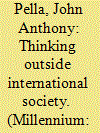

|
|
|
|
|
| Publication |
2013.
|
| Summary/Abstract |
English School theory presently features two distinct conceptions of world society, both of which are concerned with how to best conceptualise the role of non-state actors in international politics. While a classical interpretation advocates attaching world society to non-state cosmopolitan influence, a Buzanian interpretation prefers to analyze distinct interacting non-state units. What is unfortunate is that the comparative merits of these two interpretations remain largely in question, as there has been little attempt to contrast them either conceptually or in terms of potential empirical utility. The purpose of this article is to provide just such comparisons, so as to determine the possibilities for English School theorists seeking to think outside international society. To do this the theoretical underpinnings of the two concepts are analyzed initially, after which the explanatory power of each is tested in an empirical study of the trans-Atlantic slave trade and its abolition. In light of shortcomings found with the two concepts, an alternative suggestion is then offered. The suggestion is that world society be conceptualised in accordance with the ongoing contestations between different ideologies in the non-state world, on the basis of which individuals form different types of social relationships to influence the international society of states.
|
|
|
|
|
|
|
|
|
|
|
|
|
|
|
|
| 11 |
ID:
124623


|
|
|
|
|
| Publication |
2013.
|
| Summary/Abstract |
Nietzsche's heralding of the 'Death of God' announces and exposes the condition of foundationlessness underpinning (Western) modernity and provokes the crucial question of the goals and purposes of political life. Without the figure of the divine as sanction and guide, political society lacks a stable foundation upon which to identify and legitimate itself. This paper explores the respective responses of two traditions of critical thought which engage explicitly with the challenges this poses, namely the messianic and the tragic. The central aim is to trace a series of 'traps' in evidence in both messianic and tragic thought which lead them to (re)turn to particular forms of transcendentalism; both traditions, it is argued, turn towards the divine in their responses to the 'Death of God'. However, the paper suggests that while the messianic is inextricably bound up in such a return to the divine, the tragic, as well as comprising several problematic violences, retains a particular salience in theorising subjectivity and the political under the condition of foundationlessness named by the 'Death of God'.
|
|
|
|
|
|
|
|
|
|
|
|
|
|
|
|
| 12 |
ID:
124621
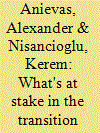

|
|
|
|
|
| Publication |
2013.
|
| Summary/Abstract |
This article draws on the theory of uneven and combined development (U&CD) to construct a non-Eurocentric and 'internationalist' analysis of the transition to capitalism. In doing so, we seek to respond to and rethink two challenges: exposures of Eurocentric notions of the 'Rise of the West' on the one hand; and recent critiques of Eurocentric assumptions in the theory of U&CD on the other. Beginning with an assessment of Robert Brenner's Anglo-centric theorisation of capitalism's origins, we argue Brenner's efforts are hamstrung by an omission of international determinations and conditions. In turn, we retrace these missing international factors through an analysis of the Mongol invasions of the 13th/14th centuries, Ottoman imperial expansion in the 15th/16th centuries and the contemporaneous discovery and colonisation of the New World. We argue that each case demonstrates the historically specific forms of U&CD that fed into - and ultimately determined - the developmental trajectory of capitalism in north-western Europe.
|
|
|
|
|
|
|
|
|
|
|
|
|
|
|
|
|
|
|
|
|